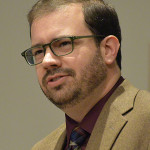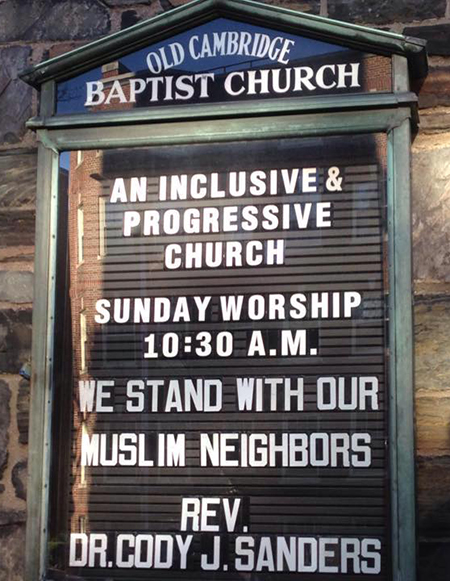 On Saturday afternoon, walking through Harvard Square on the way to my church, I saw a Muslim woman in a long black garment and niqab. It covered nearly every inch of her body, leaving only a perfectly rectangular opening where her elderly eyes gazed out.
On Saturday afternoon, walking through Harvard Square on the way to my church, I saw a Muslim woman in a long black garment and niqab. It covered nearly every inch of her body, leaving only a perfectly rectangular opening where her elderly eyes gazed out.
She stood still and silent outside of the Pinkberry across from the subway station where a crowd of people are always hanging out, talking, playing cards, reading, passing out pamphlets, busking and selling their art. As I passed the woman, a man suddenly emerged from the crowd, aggressively shouting at the Muslim woman. “Get out of here! I said get out!”
I turned to see what was happening. I saw the old woman rush inside the Pinkberry and the man turn to walk in the other direction. The man didn’t get far before a young guy stopped him to pointedly confront his act of aggression. I went inside the yogurt shop to see about the woman. She was standing beside her daughter who was purchasing her yogurt at the register. I asked the older woman if she was OK. She just looked at her daughter.
Her daughter said to me, “She doesn’t speak any English. She’s confused about what the man was saying to her.”
“He was being very rude to her,” I said.
“Everything’s OK,” her daughter assured me.
 But I knew it wasn’t.
But I knew it wasn’t.
Just a few hours before, an imam and his assistant wearing their religious attire were fatally shot on their way home from midday prayers in New York City. This year, we know of over 100 acts of assault, threats, attacks, vandalism, protests, firings and profiling cases against Muslims in the United States.
And I realized I had heard that message somewhere before: “Get out of here! I said get out!”
It isn’t just about Muslims. And it isn’t the manifestation of one man’s hatred. It’s the political mantra animating and energizing a large portion of the electorate at this very hour: send them home, build a wall, keep them out — “Get out of here!”
This Sunday, Christians all over the world will read the lectionary text from the prophet Isaiah, saying, in part:
If you remove the yoke from among you, the pointing of the finger, the speaking of evil, if you offer your food to the hungry and satisfy the needs of the afflicted, then your light shall rise in the darkness and your gloom be like the noonday. … [Y]ou shall be called the repairer of the breach, the restorer of streets to live in (58:9b-10, 12b, NRSV).
The people’s fasting and prayers were being ignored by God because they acted “as if they were a nation that practiced righteousness” (58:2, emphasis mine), but in daily life they oppressed their workers and served their own interests and quarreled and fought ceaselessly. And they wondered to God, “Why do we fast, but you do not see? Why humble ourselves, but you do not notice?” (58:3).
I wonder how many preachers are thinking of getting up in their pulpits on Sunday morning and saying, “You know why God doesn’t listen to our prayers anymore? Because we’ve sung the tunes of our political hymnody until their lyrics are all our heads have room for: ‘Send them home, keep them out, build a wall — get out, get out, get out!’ (Has a certain ring to it.) And we’ve been pointing the finger at the scapegoat and speaking evil against the innocent until our streets aren’t even safe for them anymore. And all the while, we’ve acted as if we are a nation that practiced righteousness while we oppress our workers and serve our own interests and quarrel and fight ceaselessly. That’s why!”
I haven’t written my sermon yet, so I’m not sure what I’ll say.
But I do wonder if we will have the fortitude to become repairers of the breach that our decades of political mantras have created between us. And I wonder whether we can muster the courage to become restorers of streets to live in, where Muslim women aren’t chased around by angry white men and imams aren’t executed on their way home from prayers. I wonder, then, if the gloom we’ve created for ourselves might yet become like the noonday.
